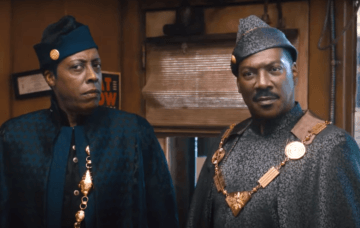by Alexander C. Kafka
 Covid has killed two and a half million people worldwide. A conspiracy-embracing, white-supremacist, fascist cohort of Americans are represented by opportunistic enablers in Congress. Texas diverts attention from its fatal mishandling of a winter storm by prematurely and irresponsibly declaring the end of the pandemic. And after a year, we’re all mostly still isolated at home — that is those fortunate enough to have a home in the wake of financial chaos.
Covid has killed two and a half million people worldwide. A conspiracy-embracing, white-supremacist, fascist cohort of Americans are represented by opportunistic enablers in Congress. Texas diverts attention from its fatal mishandling of a winter storm by prematurely and irresponsibly declaring the end of the pandemic. And after a year, we’re all mostly still isolated at home — that is those fortunate enough to have a home in the wake of financial chaos.
I don’t know about you, but I could use a laugh.
Thus I was looking forward, beyond all measure, to the sequel to Coming to America (1988), that whimsical, goofy, good-hearted John Landis-helmed star vehicle for Eddie Murphy in his prime.
Its successor, Coming 2 America, is, alas, a forced, lavishly produced clunker that tries to make up in guest stars what it lacks in purpose. Directed by Craig Brewer, it has a few chuckles, eye-popping costumes by Ruth E. Carter, some moments of nostalgic glow around its multi-generational cast, and a reprise of amusing prosthetic-job character bits for Murphy and Arsenio Hall. But it mostly wastes its stars’ talents in an overworked and uninspired script.
The premise, a reversed fish-out-of-water tale, had potential. Instead of Prince Akeem (Murphy) voyaging from the African kingdom of Zamunda to find a soulmate in Queens, his bastard son Lavelle (Jermaine Fowler) is brought from Queens to Zamunda to assume his place on the princely throne. Zamundan tradition requires a male heir, never mind that Lavelle’s half-sister Meeka (Kiki Layne) is far better suited to the job.
In the original, Akeem’s innate princeliness shone through his work mopping floors at the fast-food joint McDowell’s, ultimately winning over his love, Lisa (Shari Headley), the restaurant owner’s daughter. Now, Lavelle’s street smarts, swagger, and approachability win over his royal groomer, Mirembe (Nozamo Mbatha).
Like his father, Lavelle wants to follow his heart instead of the dictates of an arranged marriage. He has been pledged, in a match made for diplomatic convenience, to Bopoto (Teyana Taylor), the sizzlingly sexy daughter of General Izzi (Wesley Snipes), menacing leader of an impoverished and war-footed neighboring nation. Unfortunately, beneath her sizzle, Bopoto turns out to be as irritatingly subservient as her aunt, Imani (Vanessa Bell Calloway), whom Akeem left at the altar three decades ago.
As the subplots grind dutifully to their foregone conclusions, the dialogue is mostly flat and many of the characters — like Lavelle’s crass Queens family — are tired stereotypes right out of the Tyler Perry scrap heap. Tracy Morgan’s 30 Rock character used to moonlight in cash-clawing movies that were parodies of those Medea-type flicks, but here, as Lavelle’s uncle, he sinks into a project that’s all too like them.
To secure a family-friendly rating, Brewer and team avoid the original’s “gratuitous” toplessness — which actually wasn’t gratuitous at all because it was part of the gag of the supremely pampered prince’s bathing rituals. Heaven forbid kids see a bare breast, but apparently a dumb, unfunny, implied castration-threat sequence with Lavelle is no problem in Hollywood’s ongoingly absurd ratings logic. (To the screenwriters’ credit, however, Lavelle’s mom gets a studly royal bather of her own. What’s good for the gander is good for the goose.)
What the film needed was a contemporary Black neo-Marx Brothers zaniness throughout. General Izzi, as the dictator of Nexdoria, comes closest to that model, and scenes with Snipes, and his over-the-top side-strutting entrances and exits, have an energy that other segments could use.
The script makes surreal use of King Jaffe Joffer (James Earl Jones), Akeem’s father. The ailing ruler wants a funeral so lavish he’d like to enjoy it before he dies. It’s a throwback 80s celebration, featuring En Vogue, Salt-N-Pepa, and Gladys Knight, and emceed by Morgan Freeman. The scene is imaginative but its gallows humor is neither cathartic nor eccentrically poignant — like the “Bye Bye Life” number in All That Jazz. Rather, it feels somehow curdled. Maybe it’s the unfortunate timing, with the film release following a year-long global scourge that has hit seniors hardest.
Murphy’s understated reactive charm — see him break that fourth wall 27 seconds in on this classic clip from Trading Places — still occasionally twinkles here in his scenes with Hall and Fowler. And political correctness hasn’t banished Murphy and Hall’s older barbershop alter-egos, including Murphy’s whiteface kvetchy Jewish character, Saul. Murphy’s jerry-curled, soul-warbling washout Randy Watson, and Hall’s contorted, growling Reverend Brown were inspired in the first film, and still are. Hall now adds an ancient Zamundan shaman character, Baba, who adds some additional giggles.
Viewers intent on taking offense at one caricature or another will surely find grist for their outrage. But neither the parade of personae nor the cavalcade of cameos merits raised blood pressure. Nor can they prop up this saggy feature, which will do fine commercially nonetheless.
The last year has tragically underscored the old saw: Dying is easy; comedy is hard.
